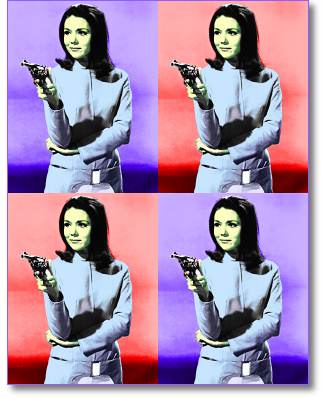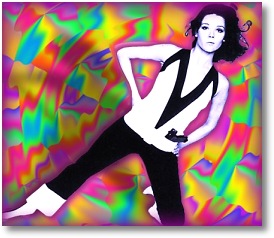 |
|
|
Avengerland: The Upside-Down Kingdom |
 |
|
A World Of True Colors?
The new polychromatic stage caught Mrs. Peel wearing miniskirts or body-hugging outfits (those catsuits that would make history) and Steed sporting ultra-fine Pierre Cardin's creations. That was the outbreak of glamour right in the middle of a more glamorous time of the apogee of The Beatles and The Rolling Stones, "Swinging London," psychedelia, pop art. And so, through the "The Avengers" window, one was able to look at original models of expression for the power of electricity and the novel laser beam, exploitation of phobias, regression therapy, mind transfer, cold war, blackmail, and even the eternal permanence of comic strips. Nevertheless, the huge iron foundations of Avengerland, seemed to crumble like a house of cards when Diana Rigg decided to book a one-way ticket and leave her place to a new partner. This was the end of a stage which would fill a whole individual volume in the history of "The Avengers" by itself. Mrs. Peel's departure opened a hollow hard to be filled, not only in the heart of the audience, but also in John Steed's. But once again, our striking gentleman who by now was getting more mature and less solemn, stood firm and with a smile welcomed his new partner, the juvenile Tara King, an unmarried wild card, played by Canadian actress Linda Thorson. Tara King would hero-worship Steed as none of her predecessors had done, giving an almost paternal look to that image of unscathed dandy. Although the most ardent fans of Emma Peel would deprive Tara of any plaudit at the time, claiming that the "chemistry" between her and Steed had been simply reduced to a mixture of two immiscible characters, it was not for that reason this era would be left without its own spell. The eccentricities not only continued, but also expanded. Empty envelopes that would cause anyone who opened them to sneeze and then choke to death; reputable citizens becoming liars just because they drank a glass of milk; enigmatic books that made their readers fall in love suddenly, or deadly small mobile black boxes which, like modern vampires of the 20th century suck electric current. These were some of the peculiarities converging on a vortex full of frenzy. Also our heroes were trapped in the most unimaginable thing, from Tara in a giant butter pat, to Steed in an exotic fight in which his opponent emerged with a different disguise whenever Steed knocked him out. As always, the unique Avengerland Seal remained stamped through the particular way the diverse topics were approached, ranging from cyphers and super-computers, to the power of the sun, schizophrenia and psychological interrogation, plastic surgery, arms smuggling to Third World dictatorships, and even a tribute to the times of Jack the Ripper. And perhaps, as a prediction of what was still to come, this series being one step ahead of its time, showed us through an episode more bizarre than its own title, that death can also have its enchantment, since paradise seems to be within reach of everyone... But the last months of the 60s were already running out by now, and the alarm of their imaginary clock was on the verge of going off sharply, as an unequivocal sign that there was time to wake up from a long dream. Sure, reality was much less glamorous. Conflicts, pressures, interests, and the inexplicable maneuverings around the TV business, became potential murderers of our "Avengers," and aiming their guns with no mercy, they shot violently against a series that ironically, had become the emblem of non-violence. Scapegoats were instantly found, and this was nothing but a smokescreen to hide the true reasons for the show's demise. That was how, at the gates of the 70s, which brought other time, other world, other figures, other markets, other tendencies, other aesthetics, "The Avengers" was consigned to memory. There was no complaint, no remorse. After all, it only was the end of another TV-series, which surely would be replaced by many others. And that was of little concern in this new scene the 70s offered, at a time in which everyone looked into the future. But the numbers stayed behind –161 episodes produced in 9 years, and 130 countries where the series was sold, constituted a record that up to this day, has not been beaten. Years later however, when video still was a mission... highly improbable but not impossible, and "The Avengers" rested languidly in the memory of more than one nostalgic, a few high value -added yet low-creative- spirit businessmen, agreed at least once to try a revival of the series. Again the original production team was there; the musician who made the tune of the show known all over the world was there; Patrick Macnee, the only actor capable of playing John Steed as we like, was there. Along with two young soon-to-be stars, Joanna Lumley and Gareth Hunt, who in their respective roles of Purdey and Mike Gambit would form a trio for the first time, "The New Avengers" came in to land on British TV in 1976. It was the new version of the glorious series of the 60s. Soon after, however, it became obvious that this sequel wouldn't follow the magic steps of its predecessor. Too much couldn't be expected either –if there's something that characterized the 70s, that was the lack of magic, enchantment, fascination. There was no longer a time of ecstasy anywhere... let alone in that dreamy England, whose contours the original series had carefully drawn. This was a world of violence, manifest sex, worrying distrust. A world where one no longer could run away from reality so easily, like the fantasies at "QQF" or "Escape in Time" suggested. With its evident lack of the tongue-in-cheek humor that had outlined other times, and its cruder and less sophisticated stories, "The New Avengers" did what it could to stay on through twenty-six episodes impeccably made and even furtively pleasant, as long as one watched them with a different slant and other intentions. But nobody could deny that the glamour of the old show, had become into a somewhat uncommon ingredient of the show's basic recipe. By 1978, "The New Avengers" was a thing of the past. Once again, the history of a series that just had added a new chapter to its huge 187-episode volume, fell into the most ignominious oblivion. Though, on second thought, rather than an oblivion, it was a prolonged lethargy. Came the 90s and due to those brilliant technological advances in film restoration, "The Avengers"–and even "The New Avengers"–rose like a phoenix from the ashes. Thanks to digital restoration, video, cable television and cinema, they flooded the screens around the world with an unusual impetus. Perhaps it was the awakening of this sleeping giant that made us understand why nowadays, when speaking about "The Avengers", we make an undeniable reference to a cult-classic.
A collection of concurrent factors is what becomes the key element at the time of deciding why "The Avengers" was such a special series. A series that moved around a virtually non-existent England, full of contrast between the Victorian era and a futurist universe. A series that painted a London in which its "real" inhabitants were rarely shown, where there were no children nor police officers, where blacks were rarely summoned, and where blood was never seen. It wasn't a matter of racism or snobbery, but an effort to avoid any contact with social problems, which would have conspired openly against the fairy-tale world the scripts were trapped in. But in that fairy-tale world, the different faces of human behavior were reflected with undeniable clarity. It was essential to read between the lines, sure, yet not too hard, so as to appreciate that one of the scriptwriters' goals did indeed lie in analyzing and ridiculing particular obsessions well settled in the conscience of certain people, like greed, revenge and the lust for power. All told by means of the most outlandish characters and scenes, and sharpest sense of humor. An archetype of a definitively egalitarian world for the only two sexes living in it, "The Avengers" proved, for the first time in a TV-series and when the mere idea was still regarded fairly distrustfully, that there is much more to women than being irremediably destined to pull pretty faces, wash the dishes, raise children or start screaming if frightened or under pressure. Ironically, none of these qualities were granted to the Avengers girls, true experts in self-defense, showing superior intelligence, having an absolute independent lifestyle... and not necessarily deprived of beauty, sensuality nor seduction. How a series with all these particularities, was not going to be exquisitely doomed to open footpaths, establish landmarks, set trends, mark eras, to last for good in the implacable timescale? Forty years ago, when The Avengers was still a sketch, someone said to Patrick Macnee in a moment of singular confusion: "Patrick, dear boy, from what you've told me of this lunatic series, everything apears [sic] to be back to front, upside down and inside out." ("Blind In One Ear," Mercury House, Second Printing, 1989, p. 209). Yes, that was "the upside-down kingdom," something like the Argentine composer Maria Elena Walsh sang at the time of our childhood, way back in the 60s. Perhaps, an upside-down kingdom that without making a point of it, tried its best to straighten a very small portion of the world which we live in. And if it didn't succeed, at least gave us a multifaceted crystal to look at it much better. Terylene, June 2001 |
| Top
of Page Table of Contents |
Copyright of the written material
is owned by its authors Web Design and Digital Art © 2008 - TheAvengers.TV |
 The
UK-USA association that, since then, would arise between both ABC TV companies,
granted an additional touch to a series reaching the top of its popularity.
In 1967 the American audience was the first to find out that Steed's eyes
were deeply gray, and Emma Peel's wavy hair was seductively auburn. The
color era had finally arrived, to paint a decade in which, however, no
further tonalities were needed, because it already had them all.
The
UK-USA association that, since then, would arise between both ABC TV companies,
granted an additional touch to a series reaching the top of its popularity.
In 1967 the American audience was the first to find out that Steed's eyes
were deeply gray, and Emma Peel's wavy hair was seductively auburn. The
color era had finally arrived, to paint a decade in which, however, no
further tonalities were needed, because it already had them all. This
is the way those great creations that not only kept pace with their time,
but also were ahead of it, are really valued by us –having the chance
of watching them several years later. This is perhaps, the moment at which
one realizes that in the fragile colloidal television of our time, the
true values pour off without ever being diluted, whereas the light products
keep eternally floating through the swings of changing fashions.
This
is the way those great creations that not only kept pace with their time,
but also were ahead of it, are really valued by us –having the chance
of watching them several years later. This is perhaps, the moment at which
one realizes that in the fragile colloidal television of our time, the
true values pour off without ever being diluted, whereas the light products
keep eternally floating through the swings of changing fashions.